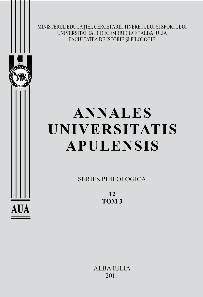Dimensiuni ale eficientizării comunicării în procesul instructiv-educativ
Aspects Regarding the Facilitation of Communication in the Instructive-Educational Process
Author(s): Liliana TAUSANSubject(s): Cultural Essay, Political Essay, Societal Essay
Published by: Universitatea »1 Decembrie 1918« Alba Iulia
Keywords: efficient communication; active listening; assertive communication; techniques to improve didactic communication
Summary/Abstract: Communication is a personal skill which cannot be separated from man. Communication is learnt both to provide understanding of the way we think, feel and establish interpersonal relations and to have greater freedom in adequately managing our own behavior and understanding the behaviour of the others. Communication is learnt, i.e. we learn to communicate while at the same time we use communication in order to learn how to communicate. The greatest part of our communication skills must be learnt. Two of the most important requirements of efficient communication are assertive communication and active listening. Assertive communication represents the ability to express thoughts and feelings using a sincere and open dialogue through which we satisfy our needs and wishes while at the same time we also respect those ones of our interlocutors. Assertive communication addresses assuming responsibility for our actions without blaming the others, self respect and respect to the others, the right to have certain values, beliefs, personal opinions, the right to decide upon personal goals and priorities. Among the advantages of using assertive communication in the educational process we identify: the discovery of internal states and personal mechanisms needed to communicate requests and opinions in an appropriate way to reduce the stress levels generated by not expressing personal opinions and needs and the development of the capacity to improve student-student, teacher-student relationships in a balanced and harmonious environment. Active listening includes participation, effective involvement of the listeners. It represents complex verbal and nonverbal responses from a listener, encouraging exploration of the interlocutor’s thoughts, feelings, and emotions. Specific communication skills of active listening generate building a non-directive dialogue. The importance of active listening in the communication process is revealed by arguments such as reducing misunderstandings in communication, fostering a climate based on emotional empathy, participation and trust, facilitating problem-solving. Among active listening skills that can be successfully used in teaching communication, in order to improve it we mention (P. Anghel, 2003): establishing a proper climate to carry out the communication process, using the body language to reinforce the message, using clarifying questions, paraphrasing and summarizing the message.
Journal: Annales Universitatis Apulensis. Series Philologica
- Issue Year: 12/2011
- Issue No: 1
- Page Range: 411-424
- Page Count: 13
- Language: Romanian

